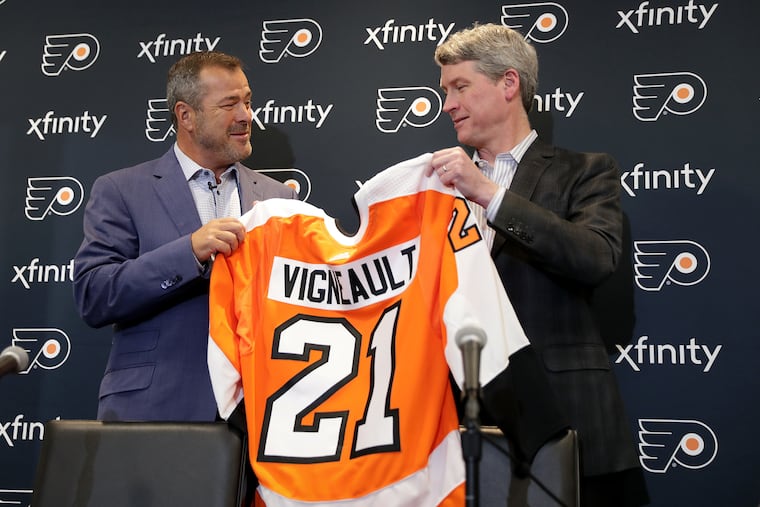Chuck Fletcher stood by Alain Vigneault and put the Flyers’ players on notice. Good. | Mike Sielski
The Flyers have fired coach after coach through the years. That's not happening now.

Over the more than 13 minutes that Flyers general manager Chuck Fletcher spent on a Zoom call with media members Monday afternoon, not long after the NHL’s trade deadline had passed, one word mattered more than any other he uttered.
Just last month, Fletcher had acknowledged that the Flyers’ makeup wasn’t quite right, and on Monday, he was asked if, during the offseason, he would consider making any changes to the team’s coaching staff: Alain Vigneault, assistants Mike Yeo and Michel Therrien, the whole group.
“No,” Fletcher said.
Bigger problems
With those two little letters, Fletcher put, or should have put, the Flyers’ entire locker room on notice. For so many years, especially this past decade of abject and uninterrupted mediocrity, the Flyers have too often taken the path of least resistance when it came to trying to improve. They have fired coach after coach, and they could always justify or rationalize that conveyor belt behind the bench: Hey, this is par for the course in the NHL. The next guy will get it right. Just watch.
Except Fletcher, in the tart and terse manner with which he answered that question, made clear what anyone who hasn’t been watching the Flyers through orange-and-black-tinted specs should have seen for themselves long ago. You can argue that the Flyers have been the league’s most disappointing team, or you can recognize that their performance this season fits snugly within their 10-year stretch of inconsistency.
Peter Laviolette was not the problem.
Craig Berube was not the problem.
Dave Hakstol was not the problem.
Scott Gordon was not the problem.
» READ MORE: Flyers sign Scott Laughton; trade Michael Raffl to Washington, send Erik Gustafsson to Montreal
And no, Alain Vigneault is not the problem now. Fletcher had a poor offseason. Signing Erik Gustafsson to try to compensate for Matt Niskanen’s absence was an obvious blunder, and he never replaced the jagged-edge play that Tyler Pitlick and Nate Thompson lent last season. But at least he seems to understand that this team is cracked at its foundation. The changes that the Flyers need to make were not changes that Fletcher was going to make at this deadline.
“I guess I’m just looking at this a bit longer term,” he said. “We’re certainly in the fight right now, and we’re going to continue to fight. But we may need some assets over the next few months to address some of the needs that we have going forward, and frankly, that may be a better use of some of those assets.”
Truth be told, Fletcher needs to be bold this offseason. He needs to make some major moves, because the Flyers need a fresh, clean start. They’re stale. This season has proved as much. The notion that they are just a player away — a No. 1 defenseman here, a scoring forward there — from rejoining the NHL’s elite has been shattered. They have lost eight times this season by three goals or more and six times by five goals or more, including twice to the league’s bottom-feeders, the Buffalo Sabres. That’s not a team that should be tweaked. That’s not a team that necessarily needs a new coach, especially when it already has one who is more accomplished in his career, who has more credibility, than any player on the roster. That’s a team that requires someone handy with nitroglycerin.
» READ MORE: Flyers coach Alain Vigneault calls out Jake Voracek: ‘He has to earn that ice time’ | Marcus Hayes
Crucial offseason of change
The Flyers didn’t create this situation for themselves overnight, and they’re unlikely to get out of it overnight. The NHL implemented its salary cap as the league came out of the 2004-05 lockout. For the subsequent 10 years, the Flyers generally operated as they had before the cap existed. They went all in every year — an approach that was far more feasible when there was no limit on the money that Ed Snider could spend. They reached the Eastern Conference Finals in 2008 and the Stanley Cup Final in 2010. They came close. But the bill for always chasing that Cup came due in the form of some silly, overreaching contracts and moves — Ilya Bryzgalov, Vinny Lecavalier, Andrew MacDonald — and a hollowed-out farm system.
Ron Hextall was given less than five years to reverse a decade-long trend, and he repeated a mistake with Jake Voracek that his predecessor, Paul Holmgren, made with Claude Giroux, allocating too many years and too much of the team’s salary cap to a player who couldn’t quite meet the measure of so great a commitment. The question is not whether Giroux and Voracek are good players. The question is whether they’re good enough to take up so much precious cap space for so long.
The results speak for themselves. From his clipped answers about Carter Hart’s regression to his assertion earlier this season that Voracek “had to earn that ice time” on the No. 1 power-play unit, Vigneault has hardly tried to hide his frustration with the Flyers’ unpredictable and uneven play. It sounds like the man who hired him has seen enough, too. So Chuck Fletcher gets the summer now to shake up the Flyers, and the one thing he’s certain of is that the coach, for once, isn’t the problem. It’s a start.